Mutation is an omnipresent biological fact. Every living being with genes is vulnerable to mutations—including us humans. Too bad that we’re so bad at biological replication-error correction. The only bright side to this is that most mutations have very minor effects and most of those don’t hurt us at all.
But of course, that’s not the sort of thing that SF authors need to gin up a really good plot. Authors want drama, and dramatic mutations.
Stories about mutants became popular around the start of the atomic age. Sometimes authors took a dim view of mutations. Either the mutants were ill, ugly, and flawed…or if they had somehow been endowed with superpowers, they couldn’t be trusted to use those for good. Other authors took a somewhat different view, insisting that difference need not imply hostility. Mutations could be benign; if they gave the mutant superpowers, those powers could be used to help others.
Mutants have featured in any number of classic SF stories. Here are a few of the older ones.
Daybreak — 2250 A.D. by Andre Norton (1952)
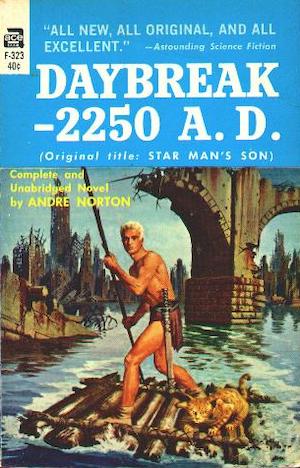
Centuries after the atomic war erased civilization, the sequestered city of Eyrie takes a dim view of outsiders. Fors of the Puma clan is not merely the son of a foreigner—his silver hair marks him as a despised mutant. The Eyrie was gracious enough not to expel him, even to raise him. But Fors will never be permitted to be a Star Man, an adult male with full rights. At least, not unless he takes dramatic action.
Accompanied by his semi-telepathic cat Lura, Fors embarks on an unsanctioned mission of exploration. The likely outcome: death in a deadly post-atomic world. The next-most-likely outcome: exile for violating Eyrie law. However, if the boy is smart, and very lucky, he might just find a treasure with which to earn his place as a man amongst his mother’s people.
Mutant by Henry Kuttner and C. L. Moore (1953)
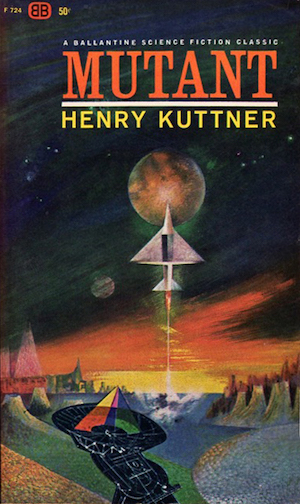
The Blowup turned cities into glowing rubble and left traumatized survivors in its wake. Nevertheless, humanity might eventually have relegated the Blowup to the forgotten past, save for one lingering after-effect: radiation-induced mutation. The mutation that created the so-called Baldies.
Baldies take their name from what can be seen of their differences: they are as hairless as an egg. It is the unseen element that bothers their baseline human cousins: Baldies are telepathic. Cue instant racist loathing and incessant persecution of Baldies by non-mutants. Peaceful coexistence seems unlikely…unless the Baldies can find some way to share their gifts with others.
Sunburst by Phyllis Gotlieb (1964)

To the rest of the world, fusion power is a blessing, the panacea that supplied all of humanity’s energy needs. To Sorrel Park, the last community on Earth still using coal power, fusion power is a menace. It is an atomic mishap waiting to happen.
Sorrel Park still remembers the long-ago fusion accident that exiled it from the rest of the world. Sorrel Park was sealed off and placed under a press ban, lest public faith in fusion be shaken.
Another consequence: a crop of mutant juvenile delinquents known as Dumplings. They ran amok once and have since been imprisoned, lest they do it again.
“Shandy” Johnson is no Dumpling—in fact she appears to be the exact opposite. She is so psionically inert that the Dumplings’ powers cannot affect her. This immunity will prove invaluable when the Dumplings escape their prison and target America’s national computer.
There Will Be Time by Poul Anderson (1972)
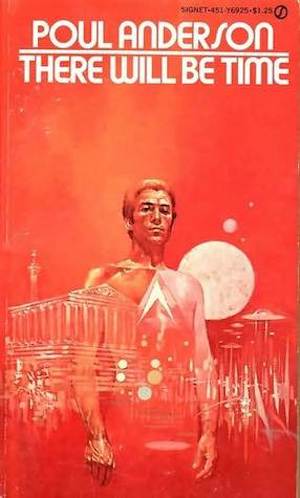
Jack Havig, born in 1933, is a mutant. Not due to nuclear war; he is a random genetic accident. This accident has given him a very odd power; Jack can travel through time merely by willing it so. What Jack cannot do is alter history. Too bad for 20th century civilization, which is fated to end in the Judgement War.
Centuries after the Judgment War, the Polynesian Maurai have come to power. Theirs is a human golden age. They are opposed by another mutant time traveler, a certain Caleb Wallis, who hails from the 19th century US and is a vicious bigot. He believes that a world ruled by Polynesians is an abomination and must be destroyed. He has a power that the Maurai Federation cannot match; he has racist allies. Only time traveler Jack Having can oppose him…if he can exploit Wallis’ blind spots and a few quirks of history.
X‑Men: God Loves, Man Kills by Chris Claremont, with illustrations by Brent Eric Anderson (1982)
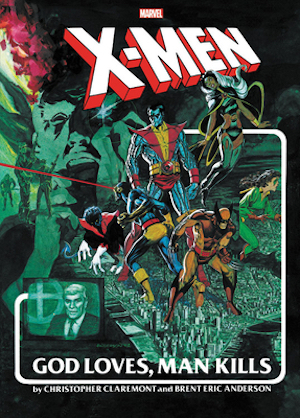
Determined to prove to baseline humans that mutants and non-mutants can coexist, Professor Charles Xavier recruited mutant children and transformed them into his private superpowered teen paramilitary: the X-Men. Not only have the X-Men failed to convince society that mutants are not dangerous, but frequent clashes between the X-Men and their evil mutant foes (clashes that result in a LOT of collateral damage) have inflamed anti-mutant paranoia.1
Reverend Stryker isn’t just an anti-mutant extremist. He is an anti-mutant extremist with resources and a plan. Not content to send his fanatics out to murder individual mutants, the Reverend has an audacious scheme to eliminate the mutant threat forever. To accomplish that, however, Stryker must commandeer one crucial component: Professor Charles Xavier himself.
***
Mutants of various kinds are common in speculative fiction. Many of you may have your own favourites, works that should have been mentioned above. Feel free to point out my egregious omissions in the comments section.
In the words of fanfiction author Musty181, prolific book reviewer and perennial Darwin Award nominee James Davis Nicoll “looks like a default mii with glasses.” His work has appeared in Publishers Weekly and Romantic Times as well as on his own websites, James Nicoll Reviews (where he is assisted by editor Karen Lofstrom and web person Adrienne L. Travis) and the 2021 and 2022 Aurora Award finalist Young People Read Old SFF (where he is assisted by web person Adrienne L. Travis). He is a four-time finalist for the Best Fan Writer Hugo Award, and is surprisingly flammable.
[1]The Brotherhood of Evil Mutants attracts a lot of press attention, further inflaming anti-mutant paranoia. Not that they see themselves as evil, of course. Nor are they really a brotherhood: women have always been a significant fraction of their membership. They should really have filed for a name change.










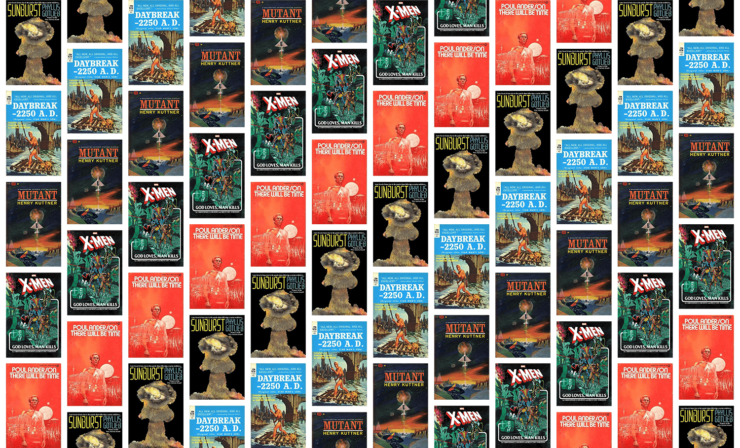
Outside the Gates, by Molly Gloss. A young boy, Vren, is exiled from his village because he has a special talent (implied mutation) – he can communicate with animals. Outside he finds other exiles, some with similarly innocuous gifts – his mentor Rusche can affect the local weather – and some with much more threatening talents, like mind control.
Every living being with genes is vulnerable to mutations—including us humans. Too bad that we’re so bad at biological replication-error correction. The only bright side to this is that most mutations have very minor effects and most of those don’t hurt us at all.
Humans are actually pretty good at error-correction (especially compared with, say, the influenza virus).
And without mutations, there’s no raw material for evolution to work with, so we most likely wouldn’t be here if our ancestors were much better at error correction…
The fact that I nearly missed my bus last night because my commuter train was delayed so a freight train could use the light rail line is _entirely_ due to the long chain of mutations leading from single celled life to us. Without Eukaryotes there could be no inconvenient transit decisions, therefore mutations are at best a mixed blessing.
Children of Morrow/Treasures of Morrow (H.M. Hoover): Telepathic children stuck in a primitive tribe escape with the assistance of other telepaths
Slan (A.E. Van Vogt): Only telepaths have tendrils! Or do they…?
Children of the Atom (Wilmar Shiras): Very intelligent mutant kids.
As RPGs are not stories, it’s proper that none were in the Five. That said, mutants are a commonplace in SFRPGs and a staple of postapocalyptic ones, the one I’d give pride of place to being Paranoia. Trust no one! The Computer is your friend!
I once asked CBC Radio’s Quirks and Quarks‘s “listener question line” about the proportion of humans who are technically mutants, based on having at least one gene that differed from those of either parent. The reply was that current studies show values of 60 to 100 such genes for each person. Most of the mutations are silent, of course.
6: as I recall, at least one of Marvel’s Sentinels concluded all humans are mutants. Hilarity ensured. However, no lesson about the hazards of programming kill-o-death robots should be taken from this.
Well, there’s this strange man on Kalgan known only as the Mule…
Larry Niven’s ‘A Gift From Earth’ has a protagonist with a fascinating mutant ‘power’ that he only finds out is a ‘power’ rather than a hindrance, or indeed that it exists at all, towards the end of the book.
Referred to in passing in later stories as ‘plateau eyes’.
What about Sterling Lanier’s “Hiero’s Journey” and “The Unforgotten Hiero”? There was supposed to have been a 3rd book to make it a trilogy, but it was never published. I consider them to be one of the best mutant novel(s) ever.
There is Terrence Cee (officially L-X-10-Terran-C) from the Bujold Vorkosiganverse, now hiding quietly on Athos.
And re the full series, you can look to Miles as well, depending on how you define mutant.
Orphans of the Sky by Robert A. Heinlein stars a two-headed mutant Joe-Jim Gregory leading a small band of mutants on the Ship. Well, maybe this doesn’t count because he’s not the protagonist.
The novels of Octavia Butler’s “Patternist” series (Wild Seed, Mind of My Mind, Clay’s Ark, Patternmaster, and Survivor) explore psychic powers as hereditary mutations. Wild Seed follows a pair of sometimes-coupled immortal mutants, Doro and Emma, over millennia while Doro runs his breeding program to generate new and better psychics. (His reasons are not what you think.)
See also More Than Human by Theodore Sturgeon (1953), a fixup of three previously published novellas. Here Sturgeon introduces “homo gestalt;” that is, a group of otherwise “damaged” people who have psionic or psychokinetic abilities and are linked together telepathically to become even stronger through their complementary powers.
Everyone complains about the name of “The Brotherhood of Evil Mutants,” but can you honestly say that you’d pass up membership in a group called “The Brotherhood of Evil Qu**rs”? What a statement! I’m half inclined to found a local chapter today.
Was Ayla, from Clan of the Cave Bear, a mutant?
Ayla was a Cro-Magnon being raised by Neanderthals.
Miles’ genes weren’t affected so not a mutant, despite the opinions of Barrayarans dealing with the cultural baggage from generations of the more mundane sort of mutant, a side effect of the catastrophe that isolated them.
“America’s national computer” Of course, just the one; as the IBM president notoriously said in the 40s, “I think there is a world market for about five computers.” The one computer to rule them all might be a good “five books” theme.
Olaf Stapledon’s Odd John comes to mind as another (1930s) example.
Also Henry Kuttner’s “Hogben Family” stories: In the first story, it’s suggested that they’re somehow the results of backwoods inbreeding (an obvious dig at the eugenics movement and the “Jukeses and Kallikaks” falsified data), but in later stories they’re supposedly descended from refugees from Atlantis.
Darwin’s Radio, by Greg Bear. Of course, attempts to destroy the mutants ensue
Slam, by A. E. Van Vogt
Anyone for John Wyndham’s The Chrysalids?
Walter Miller’s A Canticle for Leibowitz.
Since the Kuttner and Moore is about a bald, telepathic mutant fighting both anti-mutant human bigots and violent mutant supremacists, it seems likely it was an inspiration for the X-Men. But as far as I know neither Lee or Kirby have mentioned it.
There’s another Anderson (an early one IIRC) – Twilight World.
RobMRobM @11 — Terrence Cee was engineered, so I’m not sure he counts as a mutant. If so, we might want to consider Heinlein’s Friday.
David Palmer’s Emergence has several mutants, including the viewpoint character. The mutation is oddly multifactorial, and to me seems to be implausibly designed — along with other factors — to set up the narrator as the Only One Who Can Save Us.
@23: could be inspiration, could just be parallel evolution (like the many authors who wrote about schools for juvenile magic users). The stories are mostly from 20 years before the X-Men first appeared, and the book is from a dozen years before — but the mass-market PB shown above is from only 2 years before. Note also that all of the mutants are telepathic and bald (there’s none of the variety of talents), and that they’re in stable families (e.g., the first story is about a father dissuading his son from a mutants-should-rule movement) rather than a school that resembles an orphanage. I expect Lee (a self-promoter) would have denied inspiration, just as Schwartz denied any connection between the reorganized Green Lantern and the Lensman books; I wonder if there’s documentation that Kirby was ever asked.
It is now my headcanon that the Baldies from the Kuttner story are the bald, telepathic villains from Witch World and a number of other Norton novels
Kiteworld by Keith Roberts. And a big +1 for The Chrysalids.
Of course, humans aren’t the only life-forms that can mutate; for certain generations, a team of mutant turtles and a rat are culture heroes.
Mute, by Piers Anthony (Goodreads), was the one that came to mind for me. Mutants, both human and non, left, right, and center, near as I can recall, including a sentient hermit crab. This review at Goodreads sets it up pretty well.
As an aside, that reviewer had an amusing take on Anthony in general:
Why are there so many stories that connect human mutation with psychic/psionic/telepathic/pyrokinetic powers? A seemingly normal-looking (at worst, with a tendency to be bald) person who actually turns out to be immensely powerful and capable of destroying us and/or taking over!
It seems like there’s an underlying human fear at work, red scare or racist othering, perhaps. But why specifically connected to mutants? Fear of nuclear proliferation and general environmental damage, I think, but also an understated way for authors to make it clear that the mutants are being demonized through no fault of their own. This lends greater sympathy to the mutant (who is likely the primary protagonist) and also reinforces any anti-rascist messaging.
Karel Capek”s ‘War with the newts’ where these smart little aquatic fellows set some problems for human interests. And another nice novel about mutant newts is ‘Cold skin’, by Sanchez Pinol (there is a film, too).
P.D. James’ ‘The children of men’, with all earth’s population sterilized (don’t remember if it’s a genetic perturbation) (there is a film, too)
Dan Simmomn’s Hyperion, in the first story by the priest Leonard Hoyt, the Bikura people are genetically altered by the cruciform in their skin (there is a film, too; wait, no, there isn’t. Yes! they’re making it.
Let’s not forget John Wyndam’s novel Rebirth, about a post-nuclear world in which mutants are deemed the devil’s work.
Zenna Henderson’s People ?
Strange that The Golden Man by Phillip K. Dick wasn’t mentioned.
I’m not sure one would consider them “mutants”; since they were, it turns out, “created”. But Julie Czerneda’s “Clan Chronicles”, I think, would fit. They keep breeding “truer” to more powerful psychic powers. And Captain Morgan (whose story ties the Clan Chronicles with the Trade Pact Universe) is strictly human – but he also has telepathic powers – almost unheard of in humans. Obviously some sort of mutant.
35: There have been thousands and thousands and thousands and thousands of SF books about mutants. I mentioned 5. Statistically speaking, the odds of any particular book being mentioned are close to nil. In fact, with reasonable error bars it’s hard to say for sure if I mentioned any.
34: I think the People are aliens, not mutants. They remember a Home that they fled from before it was destroyed.
37: You did ask us to point out your “egregious omissions” :) But my point is that most ‘mutant’ stories give them powers, sometimes with drawbacks that mostly affect their social life. Dick’s take on the subject is quite different (I won’t spoil.)
Come to think of it, there are parallels between the Golden Man and Gordon R. Dickson’s Genetic General.
@25 Friday is one of my favorites.
And Star Man’s Son was my first Andre Norton, purchased through a book fair at school due to a Siamese version of Luna on the cover.
Would McCaffrey’s psychic types in the Rowan series qualify?
Gordon R. Dickson’s anthology “Mutants” is a personal favorite.
@31 To be fair, a mutant who can read minds or induce flames drives more plots than one who can synthesize vitamin C, and so avoid scurvy on even the longest sea voyage.
Anyone recognise this:
I can’t recall the author and title of early post-Hiroshima book with a protagonist named ‘Alaric Wayne’ who has enhanced intelligence and creativity and gathers around him other useful mutants. They comes from an independent nation that used to be in the northwest of the U.S. before the War, their competition are mutants from the Siberia state, and they end-up battling (I think) on Mars…the two teams, I think make peace with each other because they realise they’re repeating their parents’ mistakes.
The title of the novelisation, which I read first, may have been something like “The Alpha People” (definitely not “…Gamma…”), I think the original short story (in which the child Alaric, who never speaks, destroys some invading marauders using what looks like an assemblage of junk) was titled “Children of the Atom”, before the X-Men used the title.
@44 https://en.wikipedia.org/wiki/Children_of_the_Atom ?
@44: I think that’s the Anderson that I mentioned. (But if that’s the case you remember more than I do – I’ve had 40 or 50 years to forget details.)
The Obernewtyn Chronicles by Isobel Carmody feature mutant protagonists, as does the Book of the Ancestor series by Mark Lawrence. I highly recommend both.
@44-46: Children of the Atom is by Shiras, not Anderson, and has rather less conflict than the summary above; the summary sounds like Twilight World, a fixup beginning with “Tomorrow’s Children”.